
Biên dịch Linux kernel xài lệnh make để chỉ ra các mục đích biên dịch (target).
Có bao nhiêu mục đích biên dịch trong Linux kernel? make help sẽ trả lời câu hỏi này cho bạn.
Nói cách khác
make help sẽ chỉ ra tất cả các mục tiêu biên dịch Linux kernel cho bạn.
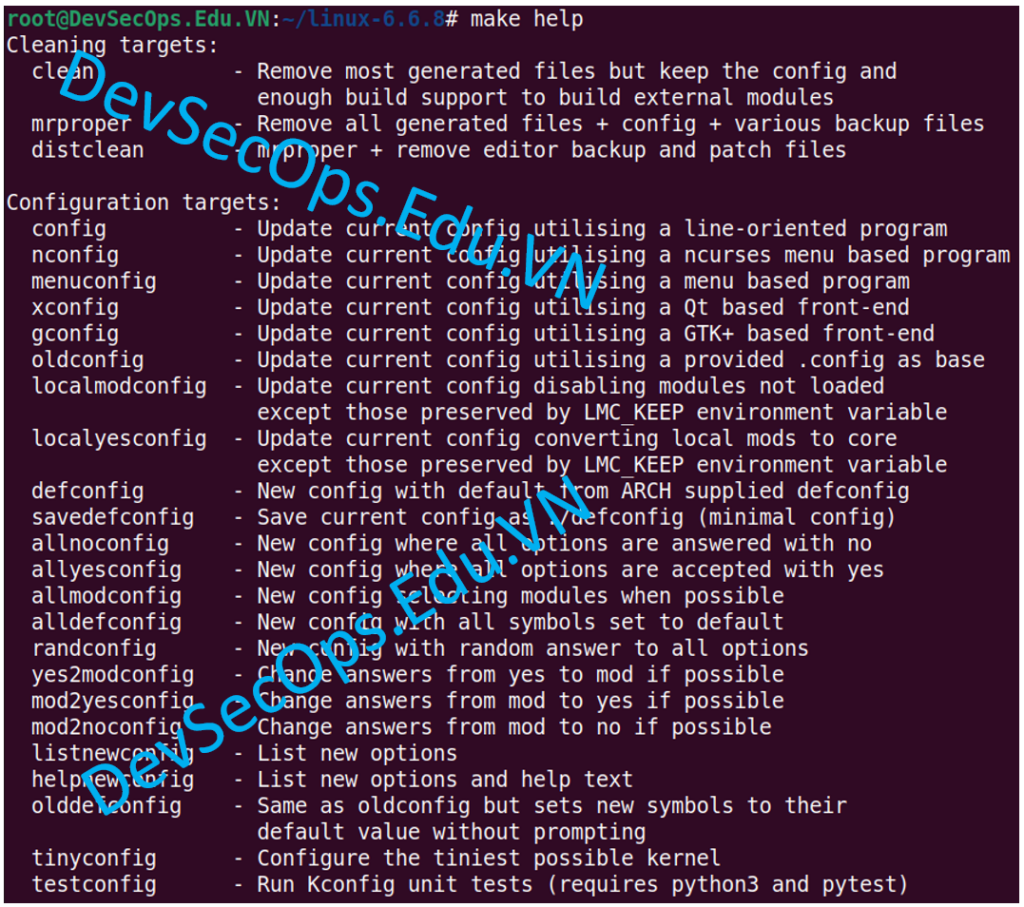
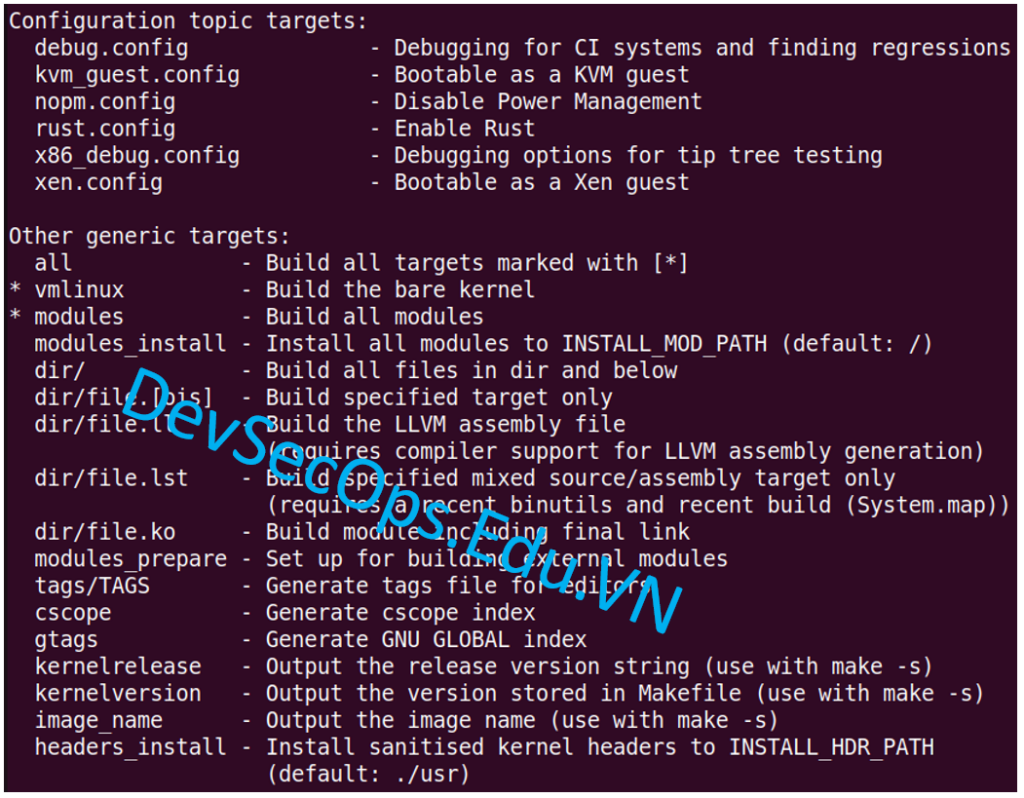
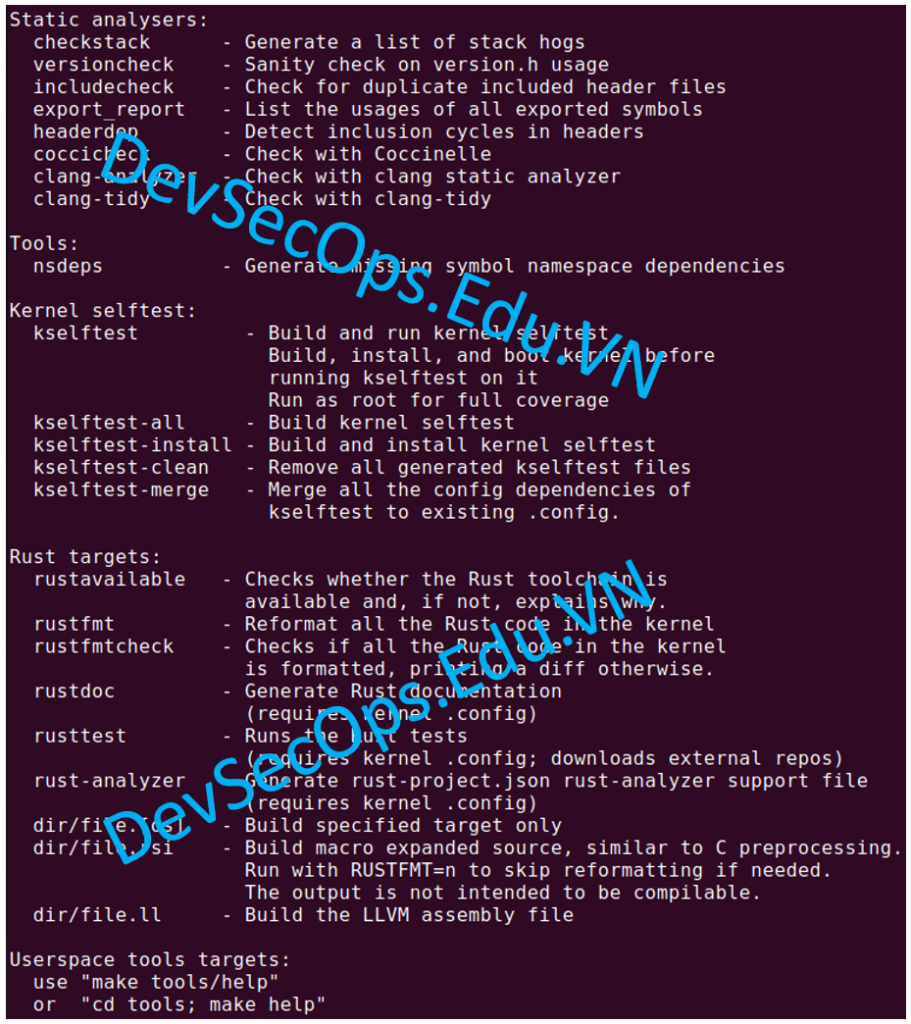
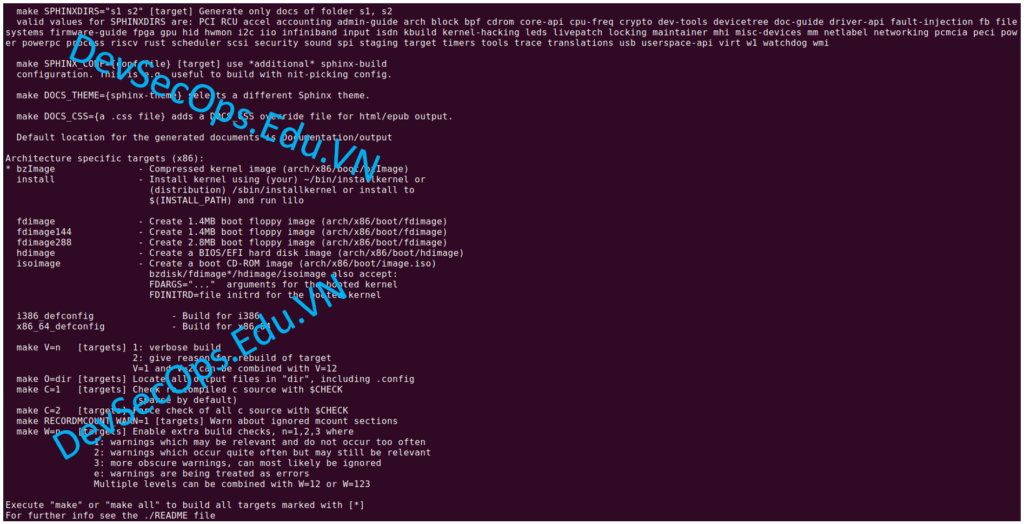
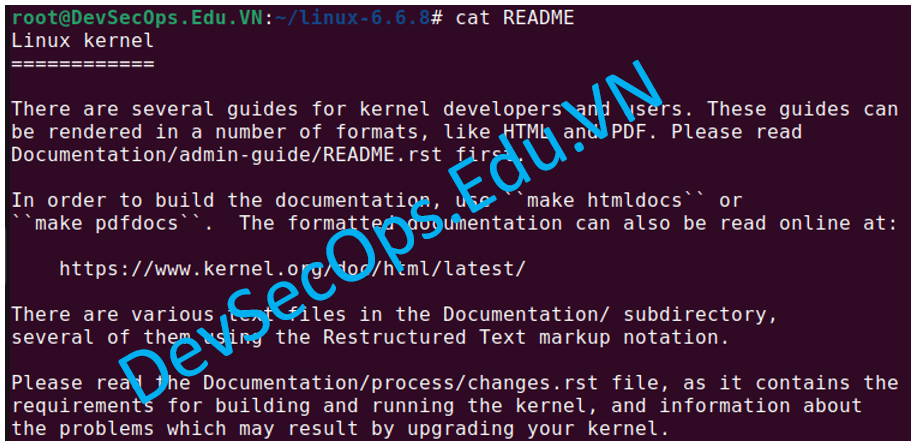
make help
Cleaning targets:
clean - Remove most generated files but keep the config and
enough build support to build external modules
mrproper - Remove all generated files + config + various backup files
distclean - mrproper + remove editor backup and patch files
Configuration targets:
config - Update current config utilising a line-oriented program
nconfig - Update current config utilising a ncurses menu based program
menuconfig - Update current config utilising a menu based program
xconfig - Update current config utilising a Qt based front-end
gconfig - Update current config utilising a GTK+ based front-end
oldconfig - Update current config utilising a provided .config as base
localmodconfig - Update current config disabling modules not loaded
except those preserved by LMC_KEEP environment variable
localyesconfig - Update current config converting local mods to core
except those preserved by LMC_KEEP environment variable
defconfig - New config with default from ARCH supplied defconfig
savedefconfig - Save current config as ./defconfig (minimal config)
allnoconfig - New config where all options are answered with no
allyesconfig - New config where all options are accepted with yes
allmodconfig - New config selecting modules when possible
alldefconfig - New config with all symbols set to default
randconfig - New config with random answer to all options
yes2modconfig - Change answers from yes to mod if possible
mod2yesconfig - Change answers from mod to yes if possible
mod2noconfig - Change answers from mod to no if possible
listnewconfig - List new options
helpnewconfig - List new options and help text
olddefconfig - Same as oldconfig but sets new symbols to their
default value without prompting
tinyconfig - Configure the tiniest possible kernel
testconfig - Run Kconfig unit tests (requires python3 and pytest)
Configuration topic targets:
debug.config - Debugging for CI systems and finding regressions
kvm_guest.config - Bootable as a KVM guest
nopm.config - Disable Power Management
rust.config - Enable Rust
x86_debug.config - Debugging options for tip tree testing
xen.config - Bootable as a Xen guest
Other generic targets:
all - Build all targets marked with [*]
* vmlinux - Build the bare kernel
* modules - Build all modules
modules_install - Install all modules to INSTALL_MOD_PATH (default: /)
dir/ - Build all files in dir and below
dir/file.[ois] - Build specified target only
dir/file.ll - Build the LLVM assembly file
(requires compiler support for LLVM assembly generation)
dir/file.lst - Build specified mixed source/assembly target only
(requires a recent binutils and recent build (System.map))
dir/file.ko - Build module including final link
modules_prepare - Set up for building external modules
tags/TAGS - Generate tags file for editors
cscope - Generate cscope index
gtags - Generate GNU GLOBAL index
kernelrelease - Output the release version string (use with make -s)
kernelversion - Output the version stored in Makefile (use with make -s)
image_name - Output the image name (use with make -s)
headers_install - Install sanitised kernel headers to INSTALL_HDR_PATH
(default: ./usr)
Static analysers:
checkstack - Generate a list of stack hogs
versioncheck - Sanity check on version.h usage
includecheck - Check for duplicate included header files
export_report - List the usages of all exported symbols
headerdep - Detect inclusion cycles in headers
coccicheck - Check with Coccinelle
clang-analyzer - Check with clang static analyzer
clang-tidy - Check with clang-tidy
Tools:
nsdeps - Generate missing symbol namespace dependencies
Kernel selftest:
kselftest - Build and run kernel selftest
Build, install, and boot kernel before
running kselftest on it
Run as root for full coverage
kselftest-all - Build kernel selftest
kselftest-install - Build and install kernel selftest
kselftest-clean - Remove all generated kselftest files
kselftest-merge - Merge all the config dependencies of
kselftest to existing .config.
Rust targets:
rustavailable - Checks whether the Rust toolchain is
available and, if not, explains why.
rustfmt - Reformat all the Rust code in the kernel
rustfmtcheck - Checks if all the Rust code in the kernel
is formatted, printing a diff otherwise.
rustdoc - Generate Rust documentation
(requires kernel .config)
rusttest - Runs the Rust tests
(requires kernel .config; downloads external repos)
rust-analyzer - Generate rust-project.json rust-analyzer support file
(requires kernel .config)
dir/file.[os] - Build specified target only
dir/file.rsi - Build macro expanded source, similar to C preprocessing.
Run with RUSTFMT=n to skip reformatting if needed.
The output is not intended to be compilable.
dir/file.ll - Build the LLVM assembly file
Userspace tools targets:
use "make tools/help"
or "cd tools; make help"
Kernel packaging:
rpm-pkg - Build both source and binary RPM kernel packages
srcrpm-pkg - Build only the source kernel RPM package
binrpm-pkg - Build only the binary kernel RPM package
deb-pkg - Build both source and binary deb kernel packages
srcdeb-pkg - Build only the source kernel deb package
bindeb-pkg - Build only the binary kernel deb package
snap-pkg - Build only the binary kernel snap package
(will connect to external hosts)
dir-pkg - Build the kernel as a plain directory structure
tar-pkg - Build the kernel as an uncompressed tarball
targz-pkg - Build the kernel as a gzip compressed tarball
tarbz2-pkg - Build the kernel as a bzip2 compressed tarball
tarxz-pkg - Build the kernel as a xz compressed tarball
tarzst-pkg - Build the kernel as a zstd compressed tarball
perf-tar-src-pkg - Build the perf source tarball with no compression
perf-targz-src-pkg - Build the perf source tarball with gzip compression
perf-tarbz2-src-pkg - Build the perf source tarball with bz2 compression
perf-tarxz-src-pkg - Build the perf source tarball with xz compression
perf-tarzst-src-pkg - Build the perf source tarball with zst compression
Documentation targets:
Linux kernel internal documentation in different formats from ReST:
htmldocs - HTML
texinfodocs - Texinfo
infodocs - Info
latexdocs - LaTeX
pdfdocs - PDF
epubdocs - EPUB
xmldocs - XML
linkcheckdocs - check for broken external links
(will connect to external hosts)
refcheckdocs - check for references to non-existing files under
Documentation
cleandocs - clean all generated files
make SPHINXDIRS="s1 s2" [target] Generate only docs of folder s1, s2
valid values for SPHINXDIRS are: PCI RCU accel accounting admin-guide arch block bpf cdrom core-api cpu-freq crypto dev-tools devicetree doc-guide driver-api fault-injection fb filesystems firmware-guide fpga gpu hid hwmon i2c iio infiniband input isdn kbuild kernel-hacking leds livepatch locking maintainer mhi misc-devices mm netlabel networking pcmcia peci power powerpc process riscv rust scheduler scsi security sound spi staging target timers tools trace translations usb userspace-api virt w1 watchdog wmi
make SPHINX_CONF={conf-file} [target] use *additional* sphinx-build
configuration. This is e.g. useful to build with nit-picking config.
make DOCS_THEME={sphinx-theme} selects a different Sphinx theme.
make DOCS_CSS={a .css file} adds a DOCS_CSS override file for html/epub output.
Default location for the generated documents is Documentation/output
Architecture specific targets (x86):
* bzImage - Compressed kernel image (arch/x86/boot/bzImage)
install - Install kernel using (your) ~/bin/installkernel or
(distribution) /sbin/installkernel or install to
$(INSTALL_PATH) and run lilo
fdimage - Create 1.4MB boot floppy image (arch/x86/boot/fdimage)
fdimage144 - Create 1.4MB boot floppy image (arch/x86/boot/fdimage)
fdimage288 - Create 2.8MB boot floppy image (arch/x86/boot/fdimage)
hdimage - Create a BIOS/EFI hard disk image (arch/x86/boot/hdimage)
isoimage - Create a boot CD-ROM image (arch/x86/boot/image.iso)
bzdisk/fdimage*/hdimage/isoimage also accept:
FDARGS="..." arguments for the booted kernel
FDINITRD=file initrd for the booted kernel
i386_defconfig - Build for i386
x86_64_defconfig - Build for x86_64
make V=n [targets] 1: verbose build
2: give reason for rebuild of target
V=1 and V=2 can be combined with V=12
make O=dir [targets] Locate all output files in "dir", including .config
make C=1 [targets] Check re-compiled c source with $CHECK
(sparse by default)
make C=2 [targets] Force check of all c source with $CHECK
make RECORDMCOUNT_WARN=1 [targets] Warn about ignored mcount sections
make W=n [targets] Enable extra build checks, n=1,2,3 where
1: warnings which may be relevant and do not occur too often
2: warnings which occur quite often but may still be relevant
3: more obscure warnings, can most likely be ignored
e: warnings are being treated as errors
Multiple levels can be combined with W=12 or W=123
Execute "make" or "make all" to build all targets marked with [*]
For further info see the ./README file
cat README
Linux kernel
============
There are several guides for kernel developers and users. These guides can
be rendered in a number of formats, like HTML and PDF. Please read
Documentation/admin-guide/README.rst first.
In order to build the documentation, use ``make htmldocs`` or
``make pdfdocs``. The formatted documentation can also be read online at:
https://www.kernel.org/doc/html/latest/
There are various text files in the Documentation/ subdirectory,
several of them using the Restructured Text markup notation.
Please read the Documentation/process/changes.rst file, as it contains the
requirements for building and running the kernel, and information about
the problems which may result by upgrading your kernel.